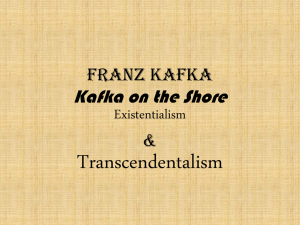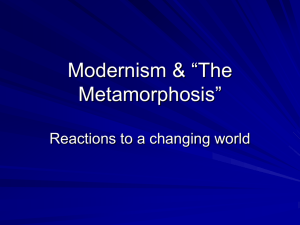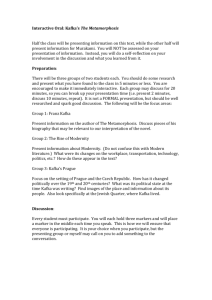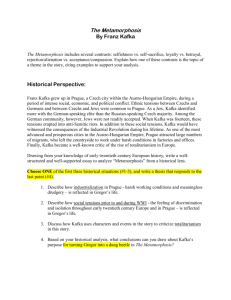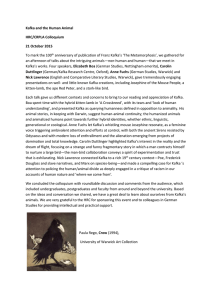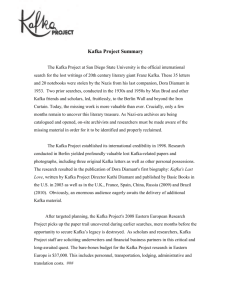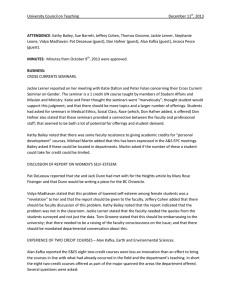Constructing Chinese History: Kafka's and Dittmar's Orientalist Discourse
advertisement
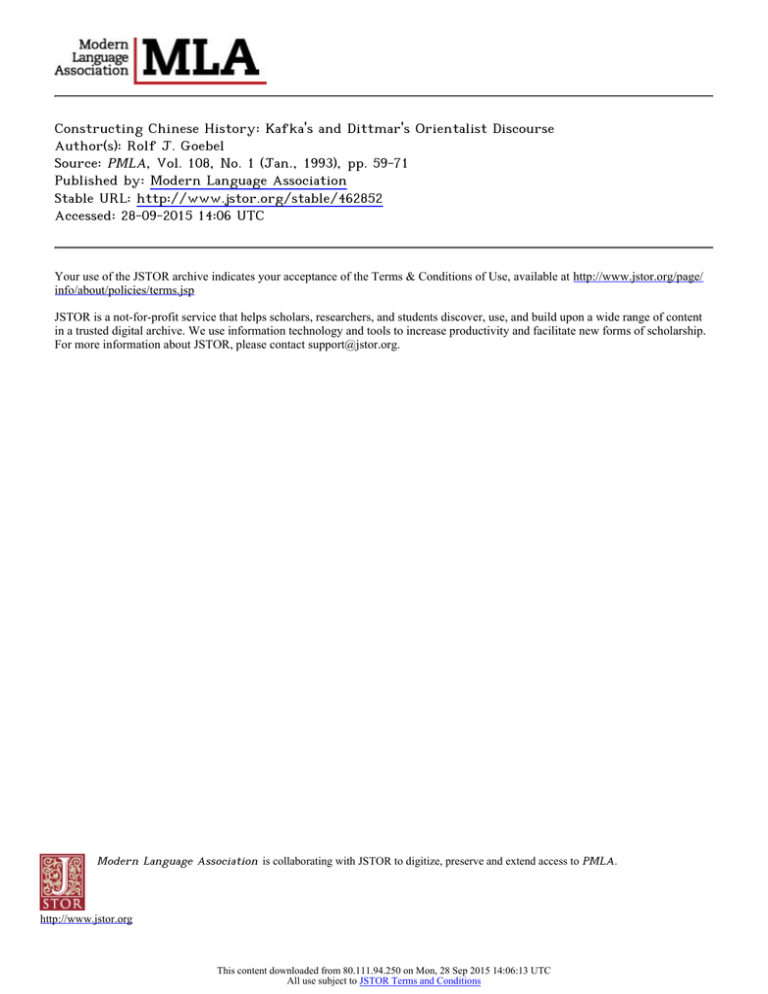
Constructing Chinese History: Kafka's and Dittmar's Orientalist Discourse Author(s): Rolf J. Goebel Source: PMLA, Vol. 108, No. 1 (Jan., 1993), pp. 59-71 Published by: Modern Language Association Stable URL: http://www.jstor.org/stable/462852 Accessed: 28-09-2015 14:06 UTC Your use of the JSTOR archive indicates your acceptance of the Terms & Conditions of Use, available at http://www.jstor.org/page/ info/about/policies/terms.jsp JSTOR is a not-for-profit service that helps scholars, researchers, and students discover, use, and build upon a wide range of content in a trusted digital archive. We use information technology and tools to increase productivity and facilitate new forms of scholarship. For more information about JSTOR, please contact support@jstor.org. Modern Language Association is collaborating with JSTOR to digitize, preserve and extend access to PMLA. http://www.jstor.org This content downloaded from 80.111.94.250 on Mon, 28 Sep 2015 14:06:13 UTC All use subject to JSTOR Terms and Conditions RolfJ. Goebel ConstructingChinese and Dittmar's ROLF J. GOEBEL, associate professor of German at the University of Alabama, Huntsville, is the author of Kritik und Revision: Kafkas Rezeption mythologischer, biblischer und historischer Traditionen (Lang, 1986) and articles in Monatshefte, Journal of the Kafka Society of America, Journal of Comparative Literature (Japan), Zeitschrift ftir Germanistik, and Comparative Literature Studies (forthcoming). He is working on a book-length study of self-reflective modes of narration in the Western literary discourseon the "Orient,"of which this essay is a part. History: Orientalist Kafka's Discourse HINA IS extraordinarily interested in learning from the German people, Paul Rohrbach writes in a 1916 article, because they are a nation characterized by order, science, and the pursuit of foreign languages and knowledge-or so he was told by a Chinese who had studied in Germany. At the same time, Rohrbach continues, the Germans will never attain "das grof3eZiel, die Umwandlung des alten in das neue China mit deutschem Geist zu beeinflussen" 'the great goal of influencing through the German spirit the transformationof the old China into the new one' unless they seriously attempt to judge the country by its own historical essence (1 1).1Although (or precisely because) Rohrbach claims that Germany, having no colonialist interests in China, would like it to be an autonomous and equal partner, his statement is strikingly indicative of that inextricable interrelation between Western political authority and the search for knowledge which is typical of the traditional orientalist discourse about China. Perhaps too briefly defined, the term orientalism here denotes the network of knowledge, power, and writing by which China has for centuriesbeen conceptualized, represented,appreciated,and criticized in Western historiography, fiction, travel literature, and journalism. Its current critical usage derives from Edward Said's seminal study. Relying on Foucault, Said offers this definition, among others: C My contention is that without examining Orientalism as a discourse one cannot possibly understandthe enormously systematic discipline by which European culture was able to manage-and even produce-the Orient politically, sociologically, militarily, ideologically, scientifically, and imag(3) inatively during the post-Enlightenment period. Much of what Said says here and elsewhere in his book about the West's construction of the Middle East applies also to the European image of the Far East (Zhang 114). In China's multifaceted representation by orientalism, as I understand the process, the state tends to disappear as a facticity in its own 59 This content downloaded from 80.111.94.250 on Mon, 28 Sep 2015 14:06:13 UTC All use subject to JSTOR Terms and Conditions 60 ConstructingChineseHistory right, as a geopolitical reality whose history, culture, social institutions, and customs can be perceived from a "genuinely"Chinese point of view. Indeed, it is doubtful whether the Chinese have such a thing as an indigenous, autonomous selfconception, independent of and untainted by various Western influences, interpretations, and stereotypes, despite the country's traditional selfmythification as the culturallydominant and selfsufficient Middle Kingdom. Especially since the nineteenth century, Sander Gilman argues, the Chinese have imitated, assimilated, and modified the supposedly superior models of Western science, medicine, and aesthetics to such an extent that it is difficult to distinguish clearly between the network of Western views of the nation and an authentically Chinese civilization and selfunderstanding.2 The complex interrelation between Western power and Chinese cultural self-transformation, reaching its culmination during the age of colonialism, might indicate why many turn-of-the-century travelers had trouble finding an "original" civilization in Asia "uncorrupted" by European modernization and hegemony (Ginther 149-62). The hermeneutical difficultyof reconstructingan indigenous Chinese self-understandingcannot, of course, justify imposing the political categories and cultural values of the Occident on Asian reality. Nonetheless, China in Western writing, perhaps unavoidably, often seems like a text composed from a markedly Eurocentric perspective, a discursive construct, a tradition of narrative topoi.3 These are, to be sure, commonly based on the actual experience of travelers, explorers, and missionaries or are adapted from concepts and ideas found in Chinese literature, philosophy, and political writings. To a significant degree, however, orientalist topoi are a complex set of historiographic assumptions, political preconceptions, idealizations, aesthetic norms, moral values, and rhetorical conventions that originated in European philosophical and literarytraditions. This provenance does not mean, of course, that orientalist conceptions necessarily miss the reality of the countries they attempt to describe; rather, they are characterizedby that peculiar mixture of empirical observation and interpretation, truth and ideological distortion, factual report and fiction which seems to typify all cross-culturaldiscourse.4 The European Enlightenment generally idealized China as a country founded on superior principles of rational statecraft and ethics (Rose 62-67; Zhang 116-21). But eventually, as Adrian Hsia has shown, the K'ang-shi emperor's stand against the zealous missionary policies of the Catholic church in his country, the opposition of writers like Herder and Goethe to the chinoiserie of the rococo movement and to the Enlightenment's adoration of social Confucianism, and Chinese resistanceto the aggressivemercantilism of the West combined to alienate Europe from China and to reverse the nation's positive image (380-83). In Germany, Herder's influential Ideen zur Philosophie der Geschichteder Menschheit 'Ideas on the Philosophy of the History of Humankind' (pt. 3), published in 1787, while granting the Orient an important position in the development of world history, helped initiate the Eurocentricidea that the history of China-"eine balsamirte Mumie" 'an embalmed mummy,' in the author's polemical description (13)-is stagnant, repetitive, timeless (Aurich 41-43, 76-77; Rose 6667, 81-82). As oversimplifying and culturally arrogant as this interpretation certainly appears, it is not entirely in discord with the Buddhist and Hindu cyclical views of life. As G. B. Sansom points out, "Nothing can be more uncongenial to the European mind than the teaching [of these religions] as to the lack of meaning or purpose in the material universe." These beliefs necessarily clashed with the doctrine of human perfectibility that ultimately "impelled European states to extend their influence into Asia" and to search "for more wealth and knowledge" abroad (49). Written after Herder'streatise, Hegel's equally canonical, and ideologically more radical, contribution to this topos characterizes the oriental states as a patriarchal,suppressive structure represented by the theocratic despotism of the emperor and resulting in a static history-indeed, in no history at all: [D]ieseGeschichteist selbstnoch iiberwiegendgeschichtslos,denn sie ist nur die Wiederholungdes- This content downloaded from 80.111.94.250 on Mon, 28 Sep 2015 14:06:13 UTC All use subject to JSTOR Terms and Conditions 61 RolfJ. Goebel selben majestatischen Untergangs. Das Neue, das durch Tapferkeit, Kraft, Edelmut an die Stelle der vorherigen Pracht tritt, geht denselben Kreis des Verfalls und Untergangs durch. Dieser Untergang ist also kein wahrhafter,denn es wird durch alle diese rastlose Veranderung kein Fortschritt gemacht. (137) This history is itself still predominantly ahistorical, because it is merely the repetition of the same majestic decline. The new, which through courage, strength, magnanimity, replaces the splendors of the past, passes through the same cycle of decadence and decline. This decline, then, is not a true one, because through all this restless change no progress is made. (See also Avineri 223-25; Rose 85; Dawson 15.) Other typical orientalisttopoi are China's large geographical expanse and huge population; the proud cultural and political self-isolation of the Middle Kingdom; its strict legal system, oppressive moral code, and well-organized hierarchical society; the inevitable political and spiritual immaturity of the common people; and the country's ancient culture (Dawson; Zhang). In the German tradition, elaborations of, and variations on, this highly selective list of recurrent concepts-which does not represent orientalist discourse in all its complexity-can be found, in one way or another, in the writings of Herder, Hegel, Schlegel,and many other philosophersand historians of the eighteenth and nineteenth centuries. Subvertingtheir authors' intention to provide a true representation of Asian historical reality, such views frequently suffer from a onesidedness, a simplifying and reductive tendency that renders them susceptible to ideological exploitation by later writers. Together, these topoi constitute the discursivecontext in which I situate two literaryconstructions of Chinese history: Julius Dittmar's travel book Im neuen China 'In New China' and Franz Kafka's fragmentarystory "Beim Bau der chinesischen Mauer" 'Constructing the Great Wall of China.'5 To explain how Kafka's and Dittmar's particular visions of China developed from their ideological positions within the discursive space of orientalism, I examine Dittmar's travel account as a text that appropriates and manipulates tra- ditional elements of orientalistdiscourse and that Kafka's metadiscursivenarrativein turn contests and revises. In Dittmar's work, which represents the heterogeneousness of orientalist discourse, various, often contradictory Western responses to China intersect and contest one another without being fully reconciled. For this reason, his book opens up a new hermeneutical perspective on the political and historical dimensions of Kafka's text. The plurality of orientalist discourse in Dittmar's account is articulated through the voices of the author and his travel companions: Mr. Lewis, from Chicago, and Fraulein Falke, from Stuttgart,who are open-minded newcomers eager to learn more about an unfamiliarand fascinating Asian country; Mrs. Moore, from London, a sincere and well-informed Sinophile who defends traditional Chinese customs, religion, and art; and the Russian spy Herr v. Z., a prejudiced, arrogant proponent of Western hegemony who describes the Chinese as politically self-centered, xenophobic, and lacking in spiritual profundity and imagination. Dittmar himself, the faithful chronicler, listens to them all and observes everything, expressing ever-shifting political and cultural opinions. Thus the five travelers represent the ideological complexity and ambiguity that, as Gunther has shown, seems typical of the Western discourse on the Orient around the turn of the century (see also Schuster 56-89). Published in 1912, Dittmar's book records his travelsthrough China in the late autumn of 1910, "rund ein halbes Jahr, bevor die Revolution ausbrach" 'about half a year before the revolution broke out' (4). The reference is to the nationalist movement that in 1911-12 overthrewthe corrupt and decadent Ch'ing, or Manchu, dynasty and sought to establish a democratic republic. Frequently, Dittmar adheres to European cliches, generalizations,and prejudicesabout China. The Chinese are suffering from political "Schlafrigkeit" 'sleepiness' (16); visiting Mukden, he notes that the Manchus and Chinese alike are dirty, degenerate, and "roh gegeneinander und feindlich gegen den Fremden" 'rude to each other and hostile toward foreigners' (22-23). Dittmar also displays a favorite topos of orientalist discourse that perpetuatesa concept often found in classical This content downloaded from 80.111.94.250 on Mon, 28 Sep 2015 14:06:13 UTC All use subject to JSTOR Terms and Conditions 62 ConstructingChineseHistory Chinese writing:the emperor as the revered symbol of national unity, whose divine descent legitimates his authority and power but at the same time obliges him to rule justly and benevolently. Accordingly, Hegel sees him as the center of the governmental hierarchy, with the well-being of the entire state and people depending on his morality and effective reign (160-61). Giving this theme a new connotation, Dittmar argues that the disastrous economic misplanning, the decadence, and the all-pervasive corruption of the Ch'ing dynasty have drained the diseased body of China to such an extent that only drastic political and social reforms can heal the impoverishedcountry. Indeed, China's present situation is already inscribed with the unmistakable signs of immediate and historically inevitable revolutionary change. Characteristically,Dittmar reads the architecture of the imperial palace, the Forbidden City in Beijing, "in der der Sohn des Himmels in heiliger Abgeschlossenheit lebte" 'where the Son of Heaven resided in sacred seclusion,' as an allegory signifying the anachronistic nature of the present imperial system and the promise of a better future. Describing the alienated emperor as "ein Gefangener in einem goldenen Kafig" 'a prisoner in a golden cage,' Dittmar muses, "Ob nicht die neue Zeit, die in China schon machtig an die Tiire klopft, auch mit diesem glanzenden Elend aufraumen wird?" 'Will not the new era that is already mightily knocking at China's door also do away with this splendid misery?' (44). Yet the seemingly progressive tone of these statements is deceptive, for Dittmar and his companions interpret their China from the perspective of Europeans thoroughly conditioned by the orientalist topos that asserts the incompatibility of Chinese history with genuine progress. While the British tourist regards the rapidly expanding railroadas a sign that progressdoes exist in China despite traditional expectations, the Russian spy categorically rejects this argument. As he hastens to point out, the railroad was built not by the Chinese themselves but by Europeans, who forced it on the Asian nation (35). Significantly enough, he does not condemn railroad construction as a colonialist intrusion; for him, foreign intervention is the only way to introduce change to a people inimical to initiating progress themselves. For the Russian, the traditional stagnation of history is the result of the people's deeply rooted arrogance and hostility toward all whites and their inventions: "Sie halten ihr Reich fur die Mitte der Welt und sich selber fur eine Art auserwahltes Volk; wir Auslander aber sind ihnen nur Barbaren, die sie im tiefsten Herzensgrunde verachten" 'They consider their empire the center of the world and themselves a kind of chosen people; for them, we foreigners are but barbarianswhom they despise from the very bottom of their hearts' (36). Certainly not all early-twentieth-centurycommentators expressed such an unabashed justification of hegemony. In the afterword to his popular collection of Chinese poetry, Die chinesische Floite, a book that Kafka knew (Briefe 282), Hans Bethge warns that the import of European science and technology, while advantageous to modernization, would inevitably be harmful to China's ancient culture and arts (110). His anthology, then, is a melancholic monument to a deeply admired foreign civilization threatened with extinction by an aggressive onrush of Western progress that the ideologically critical editor views with profound ambivalence. Dittmar himself, in the chapter preceding the debate between Mrs. Moore and the Russian spy, clearly recognizes "[d]ie drohende Gefahr der Fremdherrschaft"'the impending danger of foreign domination' in the politically weakened China (34). Thus we would expect him to disagree with the Russian, who dubiously manipulates the traditional Chinese conception of themselves as the inhabitants of the Middle Kingdom and unabashedly endorses technocratic hegemony. At the steadily growing foreign legation quarter in Beijing, however, Dittmar too falls victim to the colonialist discourse of his time, marveling at "diese stattliche Ausstellung europaischer Machtmittel" 'this impressive exhibition of European instruments of power,' which surely influenced the Chinese to abandon some of their nationalistic arrogance and interact with the Europeans as with "Gleichstehenden" 'equals' (45). That the Europeans in turn were not inclined to treat the Chinese as equals is of course part of the political hypocrisy that characterizes the This content downloaded from 80.111.94.250 on Mon, 28 Sep 2015 14:06:13 UTC All use subject to JSTOR Terms and Conditions RolfJ. Goebel presence of the Western powers in Asia, and Dittmar fully subscribes to this ideology. When he visits Tsingtao, the capital of the Germanleased territory of Kiaochow, his patriotic heart rejoices at the sight of this "stattliche Ansiedlung eines grof3en Volkes" 'impressive settlement of a great people' (72), and he spends considerable time recapitulatingthe colonialistic learning process by which Germany gradually came to discover and appreciate the potential significance of this "Oase" 'oasis' of the German character on Chinese soil. At the beginning, Tsingtao was intended only as a stronghold of the German fleet. Later,the European nation realizedthat the town "[hat] nur darauf [ge]warte[t]"'was only waiting' to be developed as an international trading port. But for Dittmar, the true significance of this German colonialist bastion is that it finally came to be "[e]ine anschauliche Darstellung unserer Kultur, eine Ausstellung unserer Ttichtigkeit" 'a graphic depiction of our culture, an exhibition of our efficiency,' although, as the author adds without so much as a trace of irony, the Germans did not originally intend this boastful demonstration (78). Not all commentators were convinced of the advantages and the necessity of Germany's presence in Kiaochow. As early as 1898, Franz Mehring, arguing from a social democratic perspective, harshly criticized his country's leasing treaty with China as a shameful act of capitalist greed for profit. Unlike the British, French, and Dutch, the Germans, he points out, began their colonialist politics very late, "im absteigenden Aste der kapitalistischen Entwicklung" 'on the descending branch of the development of capitalism.' A burden for the taxpayers at home, colonial politics is a historical anachronism and a moral and political disgrace for the German nation (270-72). By contrast, some fourteen years later Dittmar justifies the imposition of German-and, implicitly, European-military power, expansionistic tradingpolicy, and cultural norms on China, advancing the dubious argument that these constitute not intentional acts of political aggression but the inevitable revelation of Western superiority over Asia-a superiority inscribed in, and, at the time of Dittmar's writing, fully disclosed 63 by, the course of (Western, colonialist) history itself. Seemingly downplaying the brute power of the Germans' militaryand technological presence in China, the author concludes his description of Tsingtao by reemphasizing the exemplary supremacy of Germany's cultural productivity. What arouses the "Neid" 'envy' of the other foreign nations and the "staunend[e]Bewunderung" 'stunned admiration' of the Chinese is daBdieseAusstellungunsererTtichtigkeituns Siege gewann,die unswederunsereKanonennochunsere hatteneinbringenkonnen.Seitdemwir Eisenbahnen daserkannt,istdie BedeutungderKoloniefestgelegt: sie soll den VolkernAsienseine Art Anschauungsunterricht gebenvondem,waswiraufallenGebieten menschlichenFortschrittsleisten k6nnen; dann mogen sie selbererwagen,ob es sich lohnt, unsere Warenzu kaufenund in derPolitikmit uns zusammen zu gehen. (79) that this displayof our efficiencywon us victories thatneitherourcannonsnorourrailroadswereable to bringus. Sincewe have realizedthis, the signifiit is to give canceof the colonyhasbeenestablished: lesson to thepeoplesof Asiaa kindof demonstration of whatwe can achievein all areasof humanprogress;then let them considerfor themselveswhether it is worththeirwhileto buyourgoodsandcooperate with us in politics. The message is as self-assured as it is threatening. His admiration for China's art and his respect for the population's industriousness and cleverness notwithstanding, Dittmar does not grant the Asian nation the ability to develop historical self-determination. It is certainly true that Dittmar observes signs of change everywhere.He mentions the revolutionary ideas spreading among the modern Chinese soldiers, whom he nonetheless accuses of severely lacking discipline and courage (46), and he speculates about the people waiting for the opportunity to overthrow "dieses verrottete Kaiserhaus" 'this degenerate dynasty' as they had so many others before (66). But trapped in the ideological confines of orientalist discourse, Dittmar cannot but think in accordance with its topos asserting China's ahistorical stagnation. While perhaps latently inscribedin China's present sociopolitical situation, genuine progress-the translation of the popu- This content downloaded from 80.111.94.250 on Mon, 28 Sep 2015 14:06:13 UTC All use subject to JSTOR Terms and Conditions 64 ConstructingChineseHistory lation's rebellious dissatisfaction with feudalism and imperial tyranny into political action and the creation of radically new forms of society and government-can only materialize with foreign help. As Dittmar suggests, the country, supposedly incapable of transformingand renewingitself from within its own cultural tradition, must accept the superiority of the European powers as an authoritative model for its imminent revolutionary struggle. To the extent that China is denied its own history, it is also deprived of its own political voice. Dittmar's rhetoric of colonialist didactics casts the country as a politically immature pupil incapable of making autonomous decisions, except for the resolution to learn the "lesson" of the German cultural pedagogue. Here, too, Dittmar's Eurocentric textualization of China finds a precursor in traditional orientalist discourse. For Herder, the authoritarianand ritualisticstructure of China's moral code, its emphasis on strict obedience to paternal power, has kept the people in a state of "kindische Gefangenschaft der menschlichen Vernunft, Kraft und Empfindung" 'infantile imprisonment of human reason, strength, and sentiment,' which "muf3te. . . auf das ganze Gebaude des Staats einen schwachenden Einfluf3haben" 'was bound to have a weakening influence on the entire edifice of the state' ( 11). In accordance with Europe's condescending conceptualization of China, the Russian spy later repeats the standardjustification for Western colonialism as an initiator of historical progress in Asia, wondering whether after the collapse of the Manchu dynasty "etwas Neues aus den Triimmern entstehen wird" 'anything new will arise from the rubble' or "ob die weif3en Volker die Regierung Chinas uibernehmen miissen, wie England die Regierung Indiens auf sich genommen hat" 'whether the white peoples will have to take over the government of China, the way England has taken on itself the task of governing India' (1 17). Not until this point, literally on the last page of the book, does Dittmar indicate that he can think independently of the European imperialist conceptions of Chinese history. Rather surprisingly, he agrees "aus vollster Uberzeugung" 'wholeheartedly'with his British compan- ion's enthusiastic belief in China's progress, introduced not by foreign forces but through the self-determination of the "fleiBig[en] und tiichtig[en]" 'industriousand efficient'Chinese people themselves (117-18). This sudden, somewhat unconvincing change of mind indicates the ideological insecurity of a travelerwho is dimly aware that his inherited preconceptions about the Orient's ahistorical history are being severely undermined by the sociopolitical uncertainties and signs of change observable in the China of 1910. Though understandable in the historical context, Dittmar's enthusiasm for colonialist progress and his residual, but largely unacknowledged, orientalist rhetoric render his account susceptible to critical subversion by Kafka's "Constructing the Great Wall of China," written in 1917, when the political crisis of the Austrian empire, the war in Europe (Rignall 112), and, possibly, reports that reactionary forces were dominant in postrevolutionary China seemed to confirm Kafka's disbelief in the possibility of historical progress. Kafka does not mention Dittmar in his writings. But as Hartmut Binder and Weiyan Meng have shown, numerous intertextual similarities in motifs, diction, and themes suggest that Kafka most likely knew the travel account and used it as a source, together with contemporary anthologies of Chinese poetry and fairy tales (Binder, Kajka-Kommentar 218-21; Meng 77-81). Even if we cannot be entirely sure of any direct influence, Dittmar and Kafka are clearly related intertextuallywithin the discursive space of earlytwentieth-century writings on the Orient. Like Dittmar, Kafka has recourse to several standard topoi of orientalism, such as China's geographical vastness; the oppressive structure of the sociopolitical system; the Great Wall; the infinite alienation of the common, politically immature people from the imperial institution; and the theocratic aura surrounding the emperor. Yet he and Dittmar take significantly different positions within the rhetorical and ideological space of orientalism. Detracting from the textualizing tendencies that his book shares with traditional Eurocentric conceptions of China, Dittmar speaks with the self-assured voice of the world traveler'sdirect experience of the Asian countries, emphasizing that his publication is not "eine Art This content downloaded from 80.111.94.250 on Mon, 28 Sep 2015 14:06:13 UTC All use subject to JSTOR Terms and Conditions RolfJ. Goebel Abri3 der Chinakunde" 'some kind of abbreviated account of sinology' but an authentic description of modern China on the eve of the revolution (4). His concentration on empirical observation and on the contemporary, revolutionary China-as opposed to the merely historical, "sinological" state-attests to his intention to avoid orientalist textualization. As we have seen, however, Dittmar's lack of self-critical insight into the ideological biases and the rhetoricity of his writing subverts his move toward transcending the boundaries of orientalist discourse. By contrast, Kafka's "Constructing the Great Wall of China," the longest and most ambitious of his "Chinese" stories, displays a high degree of ironic, self-reflectiveawarenessof its own status as narrative.6A conspicuously unreliablenarrator earnestlyattempts to presentan objective account of the circumstances surrounding the erection of the Great Wall and the (mis)functioning of the imperial institution, but his efforts are constantly thwarted by the many unverifiable legends about the event, the pseudoscientific previous scholarship on the subject, and his own admitted intellectual insufficiencies (Rignall). Referring to his search for an explanation of the Wall's piecemeal construction, a rationale that would go beyond that offered by the builders, the narrator admits his shortcomings: "Die Grenzen, die meine Denkfahigkeit mir setzt, sind ja eng genug, das Gebiet aber, das hier zu durchlaufen ware, ist das Endlose" 'The limitations set for me by my intellectual capabilities are after all narrow enough; what's more, the field [of investigation] that would have to be covered here is the infinite' (293). The narrator's historiographic problems produce an inevitably fragmentary and speculative chronicle that-through its relentlessly selfcritical analysis of the act of representing, of furnishing a truthful, accurate, realistic interpretation of Chinese history and the imperial institution (Rignall; see also Beicken 312-15)-draws the reader's attention to the fictionalizing inherent in European constructions of China, their rhetoric, stereotypical topoi, and ideological distortions. On the one hand, then, Kafka distances himself from orientalist discourse; on the other, he appropriates it, however tenuously and ironically, for a sustained exploration of the intricate 65 interrelations among illegitimate patriarchal power over willingly submissive subjects, the construction of reality through language, and the apparentimpossibility of historical progress.This thoroughly ambiguous dialectics of preserving and critically revising tradition defines Kafka's position within the corpus of European writings on China and links the story not only to his other orientalist prose-most notably, "An Old Manuscript," "The Rejection," and "The Conscription of Troops"-but also to his self-reflective and demythifying meditations on the theme of power and suppression in Western cultural discourses:his travestiesof Greek mythology and history-"Prometheus," "Poseidon," "The Silence of the Sirens," "The New Attorney"-and his antimetaphysical hermeneutics of biblical narratives in "The City Coat of Arms" and the aphorisms on paradise (see also Nicolai; Whitlark). Kafka's antithetical text should also be seen in the context of the European response to the situation in China after 1911-12. Already in the nineteenth century there were authors-Ludwig Borne, Heinrich Heine, Franz Grillparzer, and others-who read China as an analogy to the equally anachronistic, despotic, and corrupt Prussian and Austro-Hungarian monarchies (Rose 102-17; Meng 17-18). And in Germany, progressiveintellectuals referredto the fall of the Manchu dynasty in speculating about the end of their own Wilhelmine empire (Schuster 85). But unfortunately, as C. P. Fitzgerald has shown, the hope for a postrevolutionaryChina characterized by democracy, industrial progress, reduced poverty, and rising military strength was soon to be shattered by the return of the old in new disguise: "In place of the Emperor there was soon a succession of military adventurers, corrupt and In place of the old high officials ignorant.... there appeared a swarm of self-seeking careerists, qualified for office only by flagrantly corrupt election or unabashed nepotism." After recounting other proofs that the promises of the revolution remained unfulfilled, Fitzgerald summarizes, "This tragic spectacle convinced the foreign observerthat the Chinese civilization was at an end, that the long race was run, and since This content downloaded from 80.111.94.250 on Mon, 28 Sep 2015 14:06:13 UTC All use subject to JSTOR Terms and Conditions 66 ConstructingChineseHistory there could be no return to the past, there was equally no future" (42). We do not know whether Kafka shared the contemporary disappointment about China's postrevolutionarymalaise, but his "Constructing the Great Wall of China," written five years after the end of the Ch'ing dynasty, conspicuously refrains from any direct, mimetic reference to the postrevolutionary realities of the "new China," as celebrated by Dittmar.7 Kafka was always skeptical about revolutions and the possibility of historical progress: "Der entscheidende Augenblick der menschlichen Entwicklung ist immerwahrend. Darum sind die revolutionaren geistigen Bewegungen, welche alles Friihere fir nichtig erklaren,im Recht, denn es ist noch nichts geschehen" 'The crucial moment in the development of humankind is continuous. That is why the revolutionary spiritual movements that declare void the entire past are in the right, for nothing has happened yet.' Elsewherein the same collection he writes, "An Fortschritt glauben heiBt nicht glauben, daB3ein Fortschritt schon geschehen ist. Das ware kein Glauben" 'To believe in progress does not mean to believe that any progress has already occurred. That would be no belief' (Hochzeitsvorbereitungen73, 90).8 These aphorisms help us understand why Kafka's story avoids any allusion to the "new" China of his own time and instead confines itself to an intertextual play with the traditional Eurocentric discourse on the old, prerevolutionaryChina. The move away from the contemporary actuality of Chinese politics and history into the aesthetic space of orientalist fiction can be read, I suggest, as a skeptical, revisionary stroke directed against Dittmar's optimistic ideology of a colonialist modernization bringing about a revolutionary demolition of the Ch'ing dynasty's obsolete feudalism and corruption. This criticalstance toward Dittmar's advocacy of imperialist domination and his patronizing rhetoric of historical progress would explain why Kafka's text satirically exaggerates and parodies the topos of China's historical stagnation. Kafka's thoroughly fictionalized history of the country chronicles not a living heritage that provides the present era with principles for meaningful political action but an endless succession of authoritativeyet pitifully ineffective emperors, dynasties, and conspiracies, interspersedwith battles and rebellionsthat apparently fail to introduce any political change, any new era in China. Progress is impossible because the people's historiographicignorance transformsthe accounts of long-deceased emperors, ancient battles, and ever-recurrent court intrigues into present facticity, whereas contemporary rulers, revolutions, and wars are displaced to remote times that have lost all continuity with the current political situation. History in Kafka's text is not a tradition representing the collective wisdom of the Chinese civilization but a scene of oppressive dogmas and institutions of sociopolitical power whose significations remain forever incomprehensible to the unenlightened common people and even, to a considerabledegree, to the helpless narrator himself (Rignall 120-21). The Great Wall, the emperor, ancient military catastrophes present themselves not as knowable facts but as elusive mysteries constituted by a popular discourse that is limited to vague rumors, ill-informed guesswork, pseudoreligious mystifications, and ideologically confused speculations (see also Nicolai 66-68). For Schlegel, the Great Wall, overwhelming in its architectural monumentality, is "ein Symbol des chinesischen Staates" 'a symbol of the Chinese state' and of the country's-ultimately unsuccessful-politics of seclusion from foreign cultural influence, especially that of the northern Tartars (Philosophie 66-67). The edifice is "das Eine groJ3eFactum der chinesischen Geschichte, was den Schliissel derselben enthalt.-Eigentl[ich] giebt es sonst keine chinesische Geschichte, weil eben alles in dem chinesischen Zustande ganz stationdr ist" 'the one great fact of Chinese historythat contains the key thereto.Actually, there is no Chinese history otherwise, precisely because everything about the Chinese condition is entirelystationary'(Fragmente 371). In Schlegel's view, the wall is a historical document containing a single, clearly decipherable meaning; in Kafka's narrativethe edifice is transformed into the ever-elusive object of various inconclusive and partially contradictory theories, all of which in their own ways confirm Schlegel's notion that the wall symbolizes China's immobile society and history. As the narratorsuggests, the This content downloaded from 80.111.94.250 on Mon, 28 Sep 2015 14:06:13 UTC All use subject to JSTOR Terms and Conditions 67 RolfJ. Goebel commitment of every single builder to participate in an immense community of self-sacrificingcitizens fostered throughout the country a renewed sense of political unity and nationalistic pride (290-91). Another reason for the constructionone advanced by a scholar but both architecturally implausible and ideologically dubious-is that the edifice was planned as the foundation of a new Tower of Babel to unify the collective power of the people (291-92; see also Nicolai 2631; Whitlark 221-23). Finally, the narrator abandons his futile search for rational explanations, rejecting the common justification of the wall as a protection against invading barbarians from the north; for him, these "[u]nschuldige" 'innocent' peoples never constituted a real threat to the Chinese, at least not to the inhabitants of the southeastern provinces. Admitting the obvious purposelessnessand inefficacyof the edifice, he traces its origins back to a primordial injunction issued by the country's supreme leadership, whose authorityand absolute power rest, however questionably, on mythological arguments: the designing of the wall was sanctified by the "Abglanz der gottlichen Welten" 'reflection of divine spheres,' and these commanders, as well as the decision to build the wall, have presumably existed since time immemorial (292-94; Rignall 117; Nicolai 31-39; Whitlark 223-25). Even more than the leadership, the imperial reign, by far the "allerundeutlichst[e]" 'vaguest' of all political institutions in China, defies accurate conceptualization. Even in Peking, clear knowledge about governmental affairs is "eher scheinbarals wirklich"'more apparentthan real.' Scholars of constitutional law and history merely pretend to be informed in these matters; and for the less educated citizens, who are rarelyaffected by any self-doubts, the imperial institution is but a nebulous idea expressed in a few century-old doctrinesthat are held to be eternallytrue without really being understood (294-95; see also Nicolai 40-49). In Kafka'stext, then, the insurmountable alienation between the emperor and his subjects is, to be sure, partially the result of actual sociopolitical and geographical factors: China's rigid feudalistic hierarchyand vast size, which renders any news from Peking obsolete by the time it reaches the fringes of the empire. To a greater extent, however, the estrangement is shown to result from the insufficiencies, ambiguities, and distortive obscuritiesinherent in popular political conceptualizations and ultimately in language generally. Kafka's text discloses the semidivine aura legitimizing the absolute authority of the imperial institution as little more than the imaginary creation of the people's blind veneration, the fictive construct of their politically unenlightened ideology and obedient submission to ancient dogmatic traditions. Not surprisingly, the narrator emphasizes the almost grotesque contradiction between the grandiose image of the "unsterblich[e]" 'immortal' imperial institution and the actual existence of the decadent, tired, and utterly human emperors themselves. Forever subject to the transitoriness of history,- the rulers, even entire dynasties, are continuously threatened by court intrigues and coups d'etat uknown to the common people (295-96; Nicolai 45-48). Here again, Kafka's narrative preserves and transforms intertextual traces of traditional orientalist discourse. Hegel's canonical cotnibution defines the Chinese empire as a realm of theocratic rulership whose patriarchal principle developed into an organized, secular system of state (143). Arguing from a Christian position, however, Schlegel points out that the term theocratic is suitable to describe only "[die] aufBer[e]Form, oder herkommlich[e] Urform" 'the external form, or the traditional first form,' of Chinese monarchism because this form of government lacks any "innre wahrhaft g6ttliche Kraft" 'inner, truly divine power.' Referring to the Chinese practice of worshiping the ruler as the "Son of Heaven," whose will is held to be divine, Schlegel emphasizes that "dieses Zeremoniell von verkehrt angewandten religi6sen Redensarten" 'this ceremony of falsely applied religious phrases' forms "einen groBen Kontrast mit der wirklichen Geschichte" 'a stark contrast to actual history,' that is, "der darin enthaltenen langen Reihe von schlechten Regierungen, unglucklichen Regenten und bestandigen Revolutionen, die gro6tenteils den Inhalt derselben bilden" 'the long series of bad governments, hapless rulers, and perpetual revolutions that for the most part constitute its content' (Philosophie 77). This content downloaded from 80.111.94.250 on Mon, 28 Sep 2015 14:06:13 UTC All use subject to JSTOR Terms and Conditions 68 ConstructingChineseHistory Schlegel's demythification of the Chinese ruler is confirmed and radicalized in Kafka's parable about the imperial message that never reaches its intended recipient at the country's outskirts (296; see also Nicolai 49-58; Whitlark 225-28). At the same time, the passage probably contains intertextual echoes of Dittmar's scathing critique of the ineffectual emperor's estrangement from the sociopolitical concerns of the people, without, however, preserving Dittmar's acknowledgment of revolutionary ambitions spreading among certain progressive citizens. Implicitly rejecting Dittmar's hope that, with the help of the Western powers, the anachronistic Ch'ing dynasty and the old feudal order will soon be abolished, Kafka's text centers on the irresolvable contradictions between traditional, pseudoreligious ritual-the emperor's formal aura of quasi-divine power, the court's architectural splendor, and the wretched subject's endless, worshipful yearning for a spiritual message-and social reality: the dying, powerless monarch and the insurmountable alienation of ruler and commoner. These incongruities are allegorically expressed in the infinite geographical space between the court and the subject at the farthest reaches of the empire, a distance the helpless messenger is unable to overcome even afterthousands of yearsof travel (296). The final sentence about the message-"Du aber sitzt an Deinem Fenster und ertraumst sie Dir, wenn der Abend kommt" 'You, however, sit at your window evoking it in your dreams as evening sets in'-makes clear that here, as everywhere in Kafka'sstory, the "theocratic"authority of the emperor is constituted, given reality, and sustained by the idolizing, deifying discourse of the common people alone. In this sense, the emperor is similar to other patriarchal figures and institutions in the author's oeuvre: the petty family tyrants, elusive judges, and enigmatic castle bureaucrats. Their hierarchical status and oppressive influence, too, are less factual realities than products of their self-sacrificing victims' language of fear, awe, and mythification. Ironically, the alienation effected by this fictionalizing construction of political power enables the Chinese citizens to attain a certain feeling of social liberation, to lead a morally pure life that is not subject to any "gegenwartigen Gesetze" 'present law' and that "nur der Weisung und Warnung gehorcht, die aus alten Zeiten zu uns heriiberreicht" 'obeys only the guidance and warnings that reach us from ancient times' (298). But actually, for the Chinese, as Kafka's text suggests, any measure of political freedom, however tenuous, is a mere illusion sustained within the boundaries of the political order of imperial China, within the ideological space of the traditional feudalistic and Confucian dogmas that the democratic revolution of 1911-12 tried to overcome. Dittmar's travel book and Kafka's self-reflective response show that the West's experience of Asian cultures in the twentieth century, despite a commitment to empirical observation and realistic description, is necessarilyimplicated in the same ideological network that has characterized the history of European writings on the Orient, a network that combines stereotypical topoi with genuine interest in non-Western civilizations. This discursive influence on our cultural consciousness prevails even in our age of satellite reporting and fax machines, a time when we are increasinglywilling to understandforeign nations and cultures from their own, rather than our, perspective. That present and past constructions of China are linked intertextually in Western discourse can be seen, for example, in the concluding paragraph of Time's cover story on the brutal suppression of the 1989 democratic student protests in the People's Republic: In the thousands of years spanned by Chinese history, unspeakable atrocities have occurred. Millions have suffered from the machinations of cloistered emperors, empresses and eunuchs; whole cities have been slaughtered by marauding invaders and warlords. Until Sunday [the day after the crackdown began], that all seemed safely in the past. No one quite expected it to happen again. The shock will ease with the passage of weeks. The tremors will be (Birnbaum and Chua-Eoan 27) felt for years. The pessimistic, disillusioned tone of the passage is understandable,considering that it was written immediately after the regime's tanks and gunfire had crushed the student movement's fight for human rights, democracy, and progress. Yet in suggesting that China's history is cyclical and re- This content downloaded from 80.111.94.250 on Mon, 28 Sep 2015 14:06:13 UTC All use subject to JSTOR Terms and Conditions RolfJ. Goebel petitive, the paragraphis nonetheless reminiscent of traditional orientalist discourse; it implies that we Western observers can only comprehend the social, political, and human ramifications of contemporary events like the massacre in Tienanmen Squareif we recognize that the ideological assumptions, conceptual categories, and rhetorical figures underlying our views are both limited and made possible and interpretable by earlier occidental perceptions of the Orient. The revaluation of texts like Kafka's and Dittmar's, then, not only attempts a disinterested reconstruction of past cultural meanings but intersects with our present hermeneutical problems of understanding and assessingChina's role and responsibilities in world politics.9 Notes 'All translationsfrom German sources are mine unless otherwise identified. I did, however, consult the Muir and Muir translation of Kafka's "Beim Bau der chinesischen Mauer." 2Gilman's interesting example of this cross-culturalassimilation is Lam Qua, a nineteenth-centurypainter of numerous portraits of pathological conditions, who "is the best known of the many indigenousartistswho acceptedthe Westernmode of representation.This system, together with Western political power, appeared to the mid-nineteenth-century Chinese as more powerful, and therefore preferable,to their own" (61). 'My use of topos accordswith Curtius'sinfluentialdefinition of the term as a rhetorical commonplace that is preserved with remarkablecontinuity in cultural traditions. Binder also associatesthe term with the idea that time stands still in China ("Eins gibt" 40). For general discussions of Kafka's rhetoric and narrative tropes, see the excellent studies by Corngold and Koelb. In Koelb's formulation, Kafka's rhetoric refers "to language understood as readable under more than one interpretive convention, as well as to the activity of 'reading' and 'writing' such language" (9-10). This definition could also be applied to Kafka's appropriation of orientalist discourse: "Kafka'swriting-'writing' in the sense of 'composing discourse intended to be read,' whether on paper or not-so frequentlyderives from the carefulconsiderationof other texts that we may regardlanguageitself as the material(the classical rhetorician's res) upon which his invention works" (7). 4Hsiaoffersa convenient collection of German philosophical writings on China. For excellent discussions of the changes in Western constructions of China and the Orient generally, see Franke, especially "The Colonial Invasion of China" 6691; Hsia's "Nachwort"369-89; Dawson; Gunther;and Zhang. Zhang's article is a stimulating application of Saidian notions 69 of culturaldiscourseto the concept of China in Westernwriting (114). Fine interpretationsof the image of China in European, especiallyGerman, literaturecan be found in Aurich;Schuster; Rose; and Fuchs-Sumiyoshi. Like Zhang, Fuchs-Sumiyoshi suggests that Said's notion of orientalism also applies to the Western reception of China (3-18, 159). She offers a detailed critiqueof Said's approachin the context of German literature (3-18). For a discussion of Hegel in relation to Said, see Gasche. I am indebted as well to Montrose's summation of several concerns of the new historicism: its project of examining the ideological, political, and socially productive dimensions of literary works by reinterpretingthese works in their interaction with the various discursive formations and nondiscursive institutions of their time; its emphasis on the "textuality of history" constituted by the mediation of past facts and events through society's texts and historiographic discourse; and its self-reflectiveawareness of interpretationas a product of criticswho are as involved in ideology and history as are the texts they try to understand(6-8). See also Howard's and Pechter's helpful analyses and Kaes's thoughtful exploration of new-historicist arguments for German studies. 5Foruseful philological and factual discussions of Dittmar's book and its likely influence on Kafka, see Binder, KajkaKommentar 218-21, and Meng 62-64, 77-82. Meng's work, the firstcomprehensivestudy of Kafka'sappropriationof both Chinese literature and Western writings on the country, is supplemented by an interesting survey of Kafka's reception in China and Taiwan. 6Interpretationsof Kafka's story that have influenced my own are those by Emrich (187-204); Beicken (312-15); Goodden; Kopper; and, especially, Rignall. My examination of the various historiographic, narrative, and interpretive problems depicted in Kafka's text is similar to Rignall's excellent analysis of "the relationships between history and fiction, words and deeds, writingand truth"in Kafka'stext (114). For other pertinent treatments of the concept of history, see Emrich 199-204; Keller 150-58; and Binder, "Eins gibt" 3940. Nicolai gives a careful close reading of "Constructingthe Great Wall of China" in the context of Kafka's other works. He brieflysituatesthe story in a historicalbackgrounddifferent from mine: the Ts'in period, from 221 to 206 BC, when the historical wall was first begun; the Han period, 202 BC to AD 220; and the Ming dynasty, 1368 to 1644 (Nicolai 20-21). Whitlark's interesting study of Kafka's place in orientalism differs from mine in that Whitlark uses a post-Jungian approach with special emphasis on Kafka's affinity with Taoism (see esp. 11-14, 95-112, and 218-30). 7Kafka'scontinued interest in China's culture is well documented for the years after 1912; as late as November 1923 the author asked his publishing company, Kurt Wolff, to send him two books on the country (Briefe 467; Meng 25-47). 8Rignall also suggests that Kafka's story should be read in the context of these and other skeptical statements on the failuresof progressand traditionalhistoriography.Dating from 1917, these passageswere possibly written "in response to the apparent disintegration of European civilization in a year of continuing war and erupting revolution, or in response to the crisesin [Kafka's]own physicaland emotional life. . ." (112). This content downloaded from 80.111.94.250 on Mon, 28 Sep 2015 14:06:13 UTC All use subject to JSTOR Terms and Conditions 70 Constructing Chinese History RignallconvincinglyreturnsKafka'stext to a historicalcontext that is largelyabsent from formalistdiscussions like Goodden's and Kopper's. More extensively, Robertson takes account of the political and historical dimensions of "Constructing the Chinese Wall." He sees the story as "a sustained meditation on the sources of social cohesion, with particularreference to the history of the Jews" (175-76). While his reading is illuminating in the context of the author's interest in Judaism, I would stressthat for Kafka "China"is not merely a metaphor, as Robertson implies that it is, but a reference to the actual Asian country, however mediated this designation is by Western discourse and Kafka's poetic language. See, similarly, Hoffmann 47-62, especially 49: "Das chinesische Modell eignet sich offensichtlich zur Darstellung der jtidischen Vergangenheit." 9I am grateful to Hartmut Binder for kindly providing me with a copy of Dittmar's book and to Jurgen Born for additional information. I also wish to thank Andrew J. Dunar, Peter Meister, and Daniel Schenker for their valuable comments on earlier versions of this article. WorksCited Aurich, Ursula. China im Spiegel der deutschen Literaturdes 18. Jahrhunderts. Berlin, 1935. Nendeln, Liechtenstein: Kraus, 1967. Avineri, Shlomo. Hegel's Theory of the Modern State. Cambridge:Cambridge UP, 1972. Beicken, Peter U. Franz Kafka. Eine kritische Einfiihrung in die Forschung. Frankfurt:Athenaion, 1974. Bethge, Hans, ed. and trans. Die chinesische Flote. 1907. 9th ed. Leipzig: Insel, 1919. Binder, Hartmut. "Eins gibt das andere-nicht! Kafka und die Geschichte(n)." Jenseits der Gleichnisse. Kafka und sein Werk.Ed. Luc Lamberechts and Jaak De Vos, with Edward Verhofstadt. Jahrbuch fur Internationale Germanistik, ser. A, no. 17. Bern: Lang, 1986. 27-44. . Kalka-Kommentar -u sdimtlichenErzdhlungen. 2nd ed. Muinchen:Winkler, 1977. Birnbaum, Jesse, and Howard G. Chua-Eoan. "Despair and Death in a Beijing Square." Time 12 June 1989: 24-27. Corngold, Stanley. Franz Kafka: The Necessity of Form. Ithaca: Cornell UP, 1988. Curtius, Ernst Robert. European Literature and the Latin Middle Ages. Trans. Willard R. Trask. Bollingen Series 36. Princeton: Princeton UP, 1953. Dawson, Raymond. "Western Conceptions of Chinese Civilization." The Legacy of China. Ed. Raymond Dawson. Oxford: Clarendon-Oxford UP, 1964. 1-27. Dittmar, J[ulius]. Im netuen China. Reiseeindriicke von J. Dittmar. SchaffsteinsGrine Bandchen 24. Ed. Nicolaus Henningsen. Koln: Schaffstein, [1912]. Emrich, Wilhelm. Franz Kafka. 8th ed. Wiesbaden: Akademische VerlagsgesellschaftAthenaion, 1975. Fitzgerald,C. P. The Chinese Viewof TheirPlace in the World. 1964. London: Oxford UP, 1967. Franke, Wolfgang. China and the West. Trans. R. A. Wilson. Columbia: U of South Carolina P, 1967. Fuchs-Sumiyoshi, Andrea. Orientalismus in der deutschen Literatur.-Untersuchungen zu Werken des 19. und 20. Jahrhunderts, von Goethes West-Ostlichem Divan bis Thomas Manns Joseph-Tetralogie.GermanistischeTexte und Studien 20. Hildesheim: Olms, 1984. Gasche, Rodolphe. "Hegel's Orient; or, The End of Romanticism." Occasional Papers III by Members of the Program in Literatureand Philosophy.History and Mimesis. Ed. Irving J. Massey and Sung-Won Lee. Buffalo: State U of New York, Buffalo, 1983. 17-29. Gilman, Sander L. "Lam Qua and the Development of a Westernized Medical Iconography in China." Medical History 30 (1986): 57-69. Goodden, Christian. "The Great Wall of China: The Elaboration of an Intellectual Dilemma." On Kafka. Semicentenary,Perspectives. Ed. Franz Kuna. London: Elek, 1976. 128-45. Guiinther,Christiane C. AuJbruch nach Asien: Kulturelle Fremde in der deutschen Literatur um 1900. Miinchen: ludicium, 1988. Hegel, Georg Wilhelm Friedrich. Vorlesungen iiber die Philosophie der Geschichte. Vol. 12 of Werke.Ed. Eva Moldenhauer and Karl Markus Michel. 20 vols. Frankfurt: Suhrkamp, 1970. Herder, Johann Gottfried. Ideen zur Philosophie der Geschichte der Menschheit. Dritter Theil. 1787. Vol. 14 of Sa'mtliche Werke. Ed. Bernhard Suphan. 33 vols. Hildesheim: Olms, 1967. Hoffmann, Werner. "Ansturm gegen die letzte irdische Grenze". Aphorismen und Spdtwerk Kafkas. Bern: Francke, 1984. Howard, Jean E. "The New Historicism in Renaissance Studies." English Literary Renaissance 16 (1986): 13-43. Hsia, Adrian, ed. Deutsche Denker fiber China. Insel Taschenbuch 852. Frankfurt:Insel, 1985. Kaes, Anton. "New Historicism and the Study of German Literature."German Quarterly62 (1989): 210-19. Kafka, Franz. "Beim Bau der chinesischen Mauer."Sdmtliche Erzdhlungen. Ed. Paul Raabe. Fischer Biicherei 1078. Frankfurt:Fischer, 1970. 289-99. . Briefe, 1902-1924. Gesammelte Werke. Ed. Max Brod. Frankfurt:Fischer, 1958. . Hochzeitsvorbereitungenaufdem Lande und andere Prosa aus dem Nachlafi. Gesammelte Werke. Ed. Max Brod. Frankfurt:Fischer, 1953. Keller, Karin. Gesellschaftin mythischem Bann. Studien zum Roman "Das SchloJf"und anderen WerkenFranz Kafkas. Athenaion Literaturwissenschaft 7. Wiesbaden: Akademische VerlagsgesellschaftAthenaion, 1977. Koelb, Clayton. Kafka's Rhetoric. The Passion of Reading. Ithaca: Cornell UP, 1989. Kopper, John M. "Building Walls and Jumping over Them: Constructions in Franz Kafka's 'Beim Bau der chinesischen Mauer.' " MLN 98 (1983): 351-65. Mehring, Franz. "Kiautschou." Hsia 269-74. This content downloaded from 80.111.94.250 on Mon, 28 Sep 2015 14:06:13 UTC All use subject to JSTOR Terms and Conditions RolfJ. Goebel Meng, Weiyan. Kafka und China. Studien Deutsch 4. Muinchen:ludicium, 1986. Montrose, Louis. "Renaissance LiteraryStudies and the Subject of History." English LiteraryRenaissance 16 (1986): 5-12. Muir, Willa, and Edwin Muir, trans. "The Great Wall of China." By Franz Kafka. The Complete Stories. By Kafka. Ed. Nahum N. Glatzer. New York: Schocken, 1971. 235-48. Nicolai, Ralf R. Kafkas "Beim Bau der chinesischen Mauer" im Lichte themenverwandterTexte. Wurzburg:Konigshausen, 1991. Pechter, Edward."The New Historicism and Its Discontents: Politicizing Renaissance Drama." PMLA 102 (1987): 292-303. Rignall, J. M. "History and Consciousness in 'Beim Bau der chinesischen Mauer.' " Paths and Labyrinths. Ed. J. P. Stem and J. J. White. London: Inst. of Germanic Studies, U of London, 1985. 111-26. Robertson, Ritchie. Kafka. Judaism, Politics, and Literature. Oxford: Oxford UP, 1985. Rohrbach, Paul. "Deutschland und das chinesische Geistesleben." Deutschland und China nach dem Kriege. By Rohrbach and Wolf von Dewall. Berlin: Curtius, 1916. 9-42. 71 Rose, Ernst.Blick nach Osten:Studien zum SpdtwerkGoethes und zum Chinabild in der deutschen Literatur des neunzehnten Jahrhunderts. Ed. Ingrid Schuster. Kanadische Studien zur deutschen Sprache und Literatur 26. Bern: Lang, 1981. Said, Edward W. Orientalism. 1978. New York: VintageRandom, 1979. Sansom, G. B. The Western Worldand Japan. 1950. Tokyo: Tuttle, 1977. Schlegel, Friedrich. Fragmente zur Geschichte und Politik, 1820-1828. Ed. Ursula Behler. Vol. 22 of Kritische Friedrich-Schlegel-Ausgabe.Ed. Ernst Behler with JeanJacques Anstett and Hans Eichner. Paderborn: Schoningh; Zurich: Thomas, 1979. . Philosophie der Geschichte.Ed. Jean-JacquesAnstett. Vol. 9 of KritischeFriedrich-Schlegel-Ausgabe.Ed. Ernst Behler with Jean-Jacques Anstett and Hans Eichner. Muiinchen:Schoningh; Ztrich: Thomas, 1971. Schuster, Ingrid. China und Japan in der deutschen Literatur, 1890-1925. Bern: Francke, 1977. Whitlark, James. Behind the Great Wall:A Post-Jungian Approach to Kajkaesque Literature. Rutherford: Fairleigh Dickinson UP; London: Associated UP, 1991. Zhang, Longxi. "The Myth of the Other: China in the Eyes of the West." Critical Inquiry 15 (1988): 108-31. This content downloaded from 80.111.94.250 on Mon, 28 Sep 2015 14:06:13 UTC All use subject to JSTOR Terms and Conditions
